
Press play to listen to this article
Voiced by artificial intelligence.
PARIS ‚ÄĒ French President Emmanuel Macron has picked Gabriel Attal, the outgoing minister of education, to be France‚Äôs new prime minister.
‚ÄúThe President of the Republic has appointed Mr Gabriel Attal as prime minister, and tasked him with forming a government,‚ÄĚ the French presidency announced in a press release Tuesday.
Elisabeth Borne, the second woman to serve as French prime minister, resigned Monday ahead of a much-anticipated Cabinet reshuffle. The 34-year-old Attal becomes the youngest-ever and first openly gay prime minister in French history.
Attal and Borne delivered their transition speeches in front of the prime minister’s Matignon residency in Paris in bracing temperatures below freezing.
You may like
The new prime minister outlined his priorities upon taking office: education, strengthening the middle class, restoring authority and controlling immigration.
‚ÄúThe youngest president in history has appointed the youngest prime minister in history. A symbol of audacity, the trust he puts in the youth,‚ÄĚ Attal added.
Macron is looking to rejuvenate his troubled second term after facing mass protests against a pensions reform last year and bitter dissensions within his own camp over an immigration bill which left his governing coalition badly bruised.
The surprise move has left Macron’s centrist coalition heavyweights and opponents stunned, with some disgruntled to see a potential rival grabbing the government’s top job. Macron’s pick comes as the president currently holds a lowly 30 percent approval rating according to aggregated polls and his coalition trails the far-right National Rally by about 10 points in European election polling.
‚ÄúI know I can count on your energy and commitment to implement the project … that I have announced,‚ÄĚ Macron said in a social media post about Attal’s appointment.
Attal, an ascendant star, has climbed the political ladder after leaving the Socialist Party in 2016 to back Macron‚Äôs presidential bid. He was elected to parliament in 2017 and joined the government a year later as secretary of state for the youth, becoming the youngest Cabinet member since the start of France‚Äôs Fifth Republic. He later served as government spokesperson, then budget minister, has been minister of education since July ‚ÄĒ and now becomes the fourth head of government to take office during Macron‚Äôs presidency.
Far-right leader Marine Le Pen said the French should expect “nothing” from Macron’s fourth prime minister, calling upon voters to open a “path toward change” during the June European election.
Stunned heavyweights
Attal was picked to be prime minister ahead of several contenders, including longtime ally and former Agriculture Minister Julien Denormandie. Other political heavyweights eyeing the next presidential race including Interior Minister Gérald Darmanin and Economy Minister Bruno Le Maire were less than enthusiastic to see their young colleague clinching the top spot in government while their own fate was still unknown, one top Macron ally, who was granted anonymity to speak candidly about a sensitive matter, told Playbook Paris.
Though his predecessor Elisabeth Borne resigned early Monday evening, Attal‚Äôs appointment was not confirmed until Tuesday around noon. The unusually long gap came as news of Macron‚Äôs pick for prime minister, which began circulating shortly before Borne‚Äôs exit, stirred discontent among the president‚Äôs main coalition partners, Fran√ßois Bayrou and Edouard Philippe, unhappy at the prospect of a potential rival gaining power, two senior policymakers in Macron’s camp said.
Attal recently overtook Philippe, a former prime minister, as the French politician with the most favorable opinion ratings according to an IPSOS poll released in December. He is now being discussed as a possible future presidential candidate.
French pollsters have started to include Attal in surveys, with one IFOP poll showing him as the pro-Macron camp’s second-best choice for the next presidential race in 2027 behind Philippe, who has made all but official his plans to run.
As chief of the education ministry, Attal ordered a ban on abayas, long robes worn by some Muslim women, in schools. He also announced a series of measures designed to improve pupils’ academic performances.
A spokesperson for the education sector SNES-FSU union criticized Attal for his “lightning-speed” departure from the helm of the ministry.
Opposition parties on fire
Opposition parties hit out at Attal’s youth.
‚ÄúCursed are the peoples whose princes are children,‚ÄĚ firebrand hard-left politician Jean-Luc M√©lenchon posted on X, stating that the prime minister would serve as nothing more than Macron‚Äôs “spokesperson.”
“Quick success is one thing. Proving yourself is another,‚ÄĚ Aur√©lien Pradi√©, a rising figure from the French conservative party Les R√©publicains wrote.
Education policies pushed by Attal during his relatively short tenure in the powerful ministry included bypassing parents’ approval to hold students back a year and elevating the difficulty level of standardized tests.
Attal also spearheaded a new civic service for teenagers and spoke out in favor of trialing compulsory uniforms in schools, a proposal backed by Eric Ciotti, president of the conservative Les Républicains party, and France’s First Lady Brigitte Macron.
During his New Year‚Äôs Eve address, Macron vowed to make education one of his key priorities for the new year and ‚Äúrestore students‚Äô performance level, teachers‚Äô authority and the strength of secular education‚ÄĚ.
Attal has opened up about his personal life and youth to explain his political action, describing acts of bullying and homophobia he endured during high school.
This article has been updated with details from the transition speeches.






